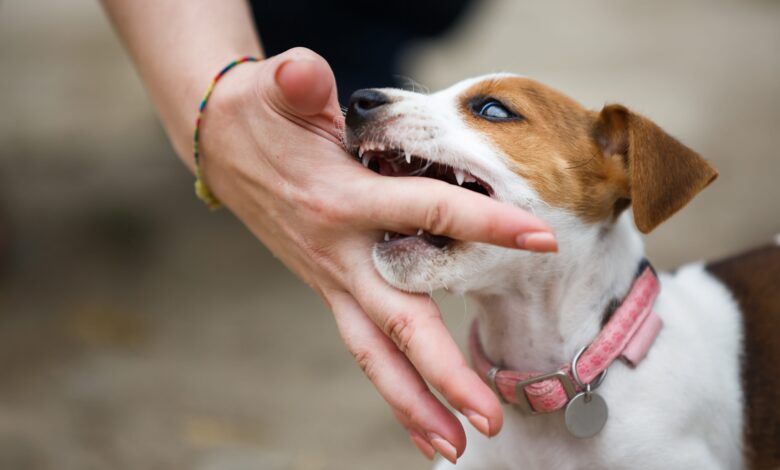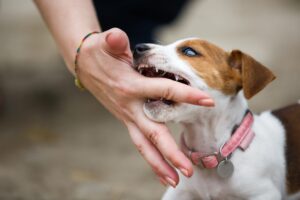How To Make A Dog Stop Biting(A Complete Guide)

How To Make A Dog Stop Biting: Since dogs are common, it is essential to prevent dog attacks. Although some dogs are friendlier than others, any dog, regardless of breed or size, is capable of biting. Even the friendliest dogs can bite or snap when they are hurt or scared. EnoughInfo.com

All children and adults should learn how to keep themselves safe around dogs, but it’s crucial to recognize that the dog’s owner is ultimately accountable for its conduct. Fortunately, if you take the right precautions, you can prevent your dog from biting someone. To keep everyone safe, responsible dog ownership and public awareness-raising are essential.
The majority of the time, dogs’ nipping and biting is typical behavior. However, just because it’s natural, it doesn’t mean that it’s right for a pet owner to not confront this behavior. It’s crucial that you discover the cause of your dog’s biting and take action to stop and avoid it for the sake of both your dog’s safety and your own.
See Also: How To Train A Dog To Shake Hands
Why dogs bite
Dogs typically bite people when they feel threatened in some way. Domesticated dogs nevertheless exhibit this innate instinct. The ‘why’ is crucial to everyone who wants to comprehend it,
- When defending itself, its territory, or a fellow canine, a dog may bite. A mother dog will defend her young with ferocity.
- A dog may bite if you startle it by waking it up or suddenly approaching it from behind.
- Even when playing, running away from a dog might result in a bite. Running away could set off herding behavior or predatory pursuit in some breeds, or the dog can think it’s amusing.
- Anyone who approaches a dog that is scared may get bitten. A circumstance like this could be something serious, like being abused or left by the side of the road, or it could be something seemingly innocuous, like a loud noise.
- Other frequent causes include illness and injury. A dog may even refuse to approach or be petted by its favorite people if it is ill or in pain.
Preventing dog bites
1. Get your dog spayed or neutered
Spaying or neutering your dog is recommended for a variety of different reasons. One of those factors is that they will be much less inclined to bite. Your dog will behave more submissively and calmly after having its hormone levels altered by spaying or neutering. The urge for your dog to stray or engage in canine combat will be lessened.
Lower testosterone levels result in less aggressive male canines who bite less after neutering your dog. How To Tell If A Cat Is Pregnant(All You Need To Know)
2. Never allow your dog to run off leash or stray off by themselves without sufficient supervision
Never allow your dog to run off leash or stray off by themselves without sufficient supervision. Being a responsible pet owner includes making sure your dog is safely enclosed in his own yard. Your dog, as well as other animals and people, will be better protected if you keep your dog in a small, secure area. How To Get Paint Off Vinyl Floors (The Ultimate Guide)
- Do not let your dog roam at large.
- Make sure your dog is wearing a muzzle when you walk it if it bites easily or has strong prey- and hunting impulses. This will stop the dog from attempting to chase other dogs or wild animals. How to Create AI-generated Stickers on WhatsApp (Quick and Easy)
- Your dog is less likely to encounter and fight other animals if they are kept inside.
- Additionally, being safe will reduce your dog’s likelihood of biting when on a hunt.
3. Avoid tense circumstances
Avoid any situations that may be needlessly stressful if you know or have reason to believe your dog might bite. Don’t take your dog to unfamiliar or busy places. Always keep an eye out for symptoms of stress in your dog’s behavior, and leave the location right once if you notice them.
- If your dog seems anxious around new people, try not to introduce them frequently.
- Crowded areas might make dogs anxious. If your dog is anxious, try to stay away from these.
- Avoiding tense situations is effective. You might still want to train your dog to be at ease in them, though.
- Create a secure area where your dog can unwind.
4. Bring your dog to obedience school
One of the greatest strategies to avoid dog bites is to attend obedience training lessons with your pet. Through these lessons, you and your dog will learn how to cooperate to prevent biting.
- Your dog will interact socially with both people and other dogs.
- Your dog will discover coping mechanisms for whatever worries it may have.
- You’ll discover how to appropriately praise or chastise behavior.
- You should anticipate learning along with your dog.
- Ask your veterinarian for suggestions on reputable obedience training programs.
Training to Stop Bites
1. Identify whether your dog is biting in a fun or aggressive manner
Every dog, particularly especially puppies, mouths other dogs. Understanding the distinction will help you better comprehend your dog’s attitude. But all forms of biting and mouthing must be prevented because they are both unacceptable.
- Your dog should have a comfortable demeanor and shouldn’t mind if you give him a playful mouthing. How To Waterproof A Wound For Swimming
- Tense and stiff body language will accompany aggressive biting.
- Bite speeds, pressure, and pain are typically higher in aggressive bites.
2. Teach your dog to treat her mouth and teeth with care
Dogs are group creatures, and when they are young, they learn by playing with each other. Although it’s common for your puppy to play bite you, you should start teaching them never to.
- Don’t say or do anything if you are bitten or mouthed because doing so will only encourage the activity.
- When you believe your dog is about to bite, wait instead. Say “no” or “no bite” after that. If he doesn’t bite you, give him a treat and some positive reinforcement. The greatest approach to training your puppy to behave better is to give him a command before he does something inappropriate.
- Leave and try again later if the dog or puppy doesn’t stop growling.
3. Use a time-out method to curb mouthing and nipping
If your puppy or older dog doesn’t respond to basic yipping and short refusal to play, try adopting a time-out approach. A potent signal that your dog’s conduct is inappropriate is to ignore it. How To Get Fiberglass Out Of Clothes(Ultimate Guide)
- Yell out loudly if you get bit.
- For five to twenty seconds, ignore the dog.
- Alternatively, you can leave your dog alone for 10 to twenty seconds.
4. Consistently give your dog praise for good behavior
It’s crucial to reinforce your dog’s good behavior. Always remember to give your pet praise, whether in the form of pets or little goodies, for pausing to nip and bite.
- Only reinforce the behavior you want to see more of.
- Keep snacks handy so that you can reward them readily when training your dog.
- Don’t overfeed your dog, use just little snacks.
5. Keep training your dog to be gentle
The nips from your dog will get softer. When your dog nips, keep yipping and interrupting the game. How To Tell If A Libra Man Is Playing You
- Respond to the lighter nips your dog gives you by yipping as he releases pressure.
- Continue doing it this manner until your dog no longer bites under pressure.
6. Carefully choose the games and toys for your dog
It’s only natural to want to play tug of war or wrestle with your dog. However, by doing this, we confuse our dogs and make it more difficult for them to learn to control their desire to bite.
- Give your puppy a chew toy or bone instead of letting him chew on your fingers or hands.
- A wrestling match may cause your dog to become extremely excited or confused.
- Think twice before engaging in a tug of war. It may cause problems with dominance.
- Make sure to discuss how to teach your dog to play tug of war with your veterinarian or trainer.
How to Deal With a Dog Safely
It’s simple to feel excited when you see a dog because they are adorable and frequently obliging. However, a dog has a speedy turn-on mechanism when it comes to strangers. Even if you don’t own a dog of your own, it’s still crucial that you and the other people in your life, especially kids, understand how to behave around dogs and when to approach one.
- Never try to pet or approach a dog you don’t know without first getting the owner’s consent. If the dog’s owner isn’t there, stay away from the animal.
- When a dog is eating, sleeping, or tending to puppies, you should never approach it. In these circumstances, dogs tend to be more protective and readily startled.
- Avoid approaching, touching, or attempting to move a dog that is hurt. Instead, seek assistance from a veterinarian or animal control.
- Never, under any circumstances, leave a young child or an infant alone with a dog
- Allow the dog to approach you when you first meet the dog. Squat or angle yourself to one side. Let it sniff your hand before you pet it.
- Avoid giving a dog your face; this includes “hugs and kisses.”
- When a dog has you in its corner, be still and avoid making eye contact. Never yell or run. Back away gradually when the dog turns away from you.
- If a dog knocks you over, curl yourself into a fetal posture on your side and shield your face and head. Stay very still and collected.
See Also: How To Crate Train A Puppy(The Ultimate Guide)
Taking Action in Case of Serious Biting
1. Playful biting can be stopped with a little at-home training.
But this is a more significant issue if your dog is acting aggressively.
- Biting that is aggressive will hurt significantly more than play-biting.
- Your dog’s body language will be rigid or tense.
2. Enlist your veterinarian’s assistance.
You should contact a professional right away if your dog behaves aggressively. Your veterinarian can assist you in identifying the cause of your dog’s vicious biting.
Your pet can help you care for any diseases that may be causing the biting.
Your veterinarian can also instruct you on how to properly praise or chastise conduct.
To learn more about how to train your dog, consider speaking with a certified pet behaviorist.
3. Keep your dog’s shots up to date
Your dog will hopefully never bite you or a stranger if it is properly trained. However, it is impossible to rule out this scenario. Maintaining your dog’s vaccination records and paperwork is crucial in case someone gets bitten.
- Keeping up with vaccines can aid in disease protection for the victim.
- If your dog is currently immunized, you will be less liable in the event of a bite.
- Keep your dog safe because unvaccinated canines that bite are often put down in many places.
- Use responsible pet ownership techniques. Never let your dog run free in a public place. If your dog has a history of biting, use a muzzle when out in public.
FAQs and replies
1. What if my dog bites someone?
In the event that your dog bites someone, you must respond promptly. Confine the dog first, then help the victim right away. If at all feasible, the victim should thoroughly wash the bite with soap and warm water before seeking immediate medical assistance.
2. How can I help a dog that has had a terrible grooming experience learn to like it again?
A nervous person can overcome their phobia of being brushed by creating a routine. Before they eat breakfast or before you go for a walk, try brushing them every morning. Increase the grooming time gradually until you are giving yourself a thorough brushing each time.
3. What does a dog genuinely rely on?
Dogs use body language, stances, and vocalizations to communicate much as people do. Dog body language can help us understand whether a dog is nervous, scared, or threatened, even though we can’t always read a dog’s body language precisely. You’re observing how the dog is acting.
Conclusion
Any dog, regardless of size, gender, or age, has the potential to bite. Even the sweetest, cuddiest, and fluffiest pet can bite if threatened. Keep in mind that a dog’s history and behavior, not its breed, determine whether or not it will bite. The majority of dog attacks can be avoided, and there are numerous things you can do at home and in your neighborhood to do so.
See Also: How To Calm A Sexually Excited Dog




